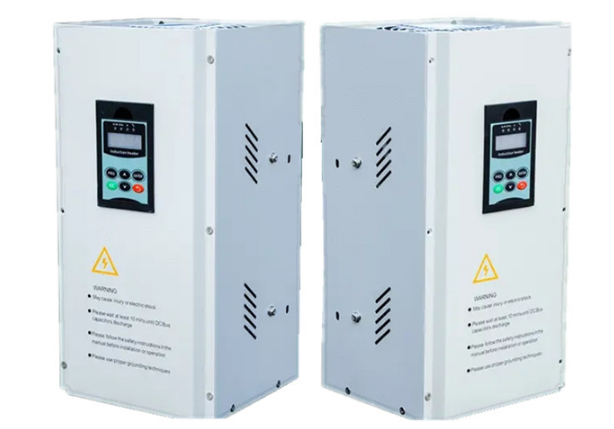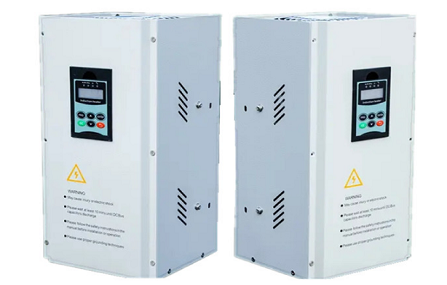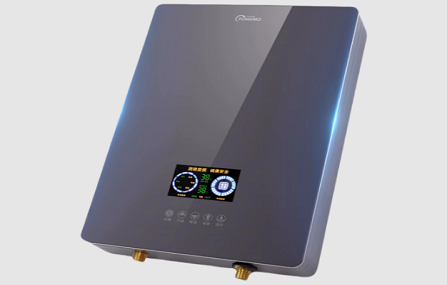Induction heating is considered a green technology due to its high energy efficiency, zero emissions, and environmentally safe operation.
Induction heaters are essential components in the induction heating process. They generate a high-frequency alternating magnetic field, and when a metal object is placed inside the coil, this field induces an electric current—known as an eddy current—within the metal. The resistance of the material to this current generates heat, effectively warming the object without direct contact.
The amount of heat produced depends on several factors: the strength of the magnetic field, the frequency of the alternating current, and the electrical resistivity of the material. Induction furnaces are versatile and can be used to heat a wide range of materials, including ferrous and non-ferrous metals, as well as semiconductors.
As a cleaner alternative to traditional heating methods, induction heaters significantly reduce energy waste and environmental impact. By using electricity to create an alternating magnetic field, they provide a safer, more efficient way to heat metals—making them a vital part of sustainable and green manufacturing technologies.
Induction furnaces are up to 90% efficient, meaning that they convert all the electrical energy into heat. This contrasts with traditional furnaces, which are typically only around 50% efficient. This means that induction furnaces can save a significant amount of energy, which can lead to lower costs and reduced greenhouse gas emissions.
Induction furnaces also produce fewer emissions than traditional furnaces. Induction furnaces do not produce any direct emissions—such as carbon dioxide or nitrogen oxides—because they operate without the use of fossil fuels. In contrast, traditional furnaces rely on burning fossil fuels to generate heat, resulting in significant emissions that contribute to air pollution and climate change.

Beyond their environmental benefits, induction furnaces also offer several additional advantages, such as:
Faster Heating:
Induction furnaces heat metal significantly faster than traditional furnaces by directly heating the metal itself, rather than warming the surrounding air. This results in quicker processing times and improved energy efficiency.
More Precise Heating:
Induction furnaces allow for highly targeted heating, enabling specific areas of a metal object to be heated without affecting the surrounding material. This precision makes them ideal for applications that require controlled and localized heating.
Safer Operation:
Induction furnaces offer a safer working environment compared to traditional furnaces, as they do not involve open flames or exposed hot surfaces, reducing the risk of burns, fire hazards, and workplace accidents.
Here are some specific examples of how induction furnaces contribute to green technology:
Electric Vehicle Batteries:
Induction furnaces are used to melt and cast the metal components in electric vehicle batteries. This method is significantly more energy-efficient than traditional techniques like arc melting, helping to reduce the carbon footprint of battery production.
Solar Panels:
The production of silicon wafers for solar panels involves melting and casting processes, which are efficiently carried out using induction furnaces. Compared to conventional methods, induction heating consumes less energy, supporting the sustainable manufacturing of renewable energy technologies.
Wind Turbines:
Metal components for wind turbines are melted and cast using induction furnaces. This energy-efficient approach supports the eco-friendly manufacturing of wind energy systems.
Automotive Industry:
In the automotive sector, induction furnaces are used for heating metal parts during processes such as hardening, forging, and joining. These methods are far more energy-efficient than traditional flame heating, while also enhancing workplace safety and process precision.
Manufacturing Industry:
Across various manufacturing applications, induction furnaces are used for welding, cutting, and melting metal parts. These processes not only save energy but also produce significantly less air pollution compared to conventional gas-fired furnaces, making them a cleaner and more sustainable option.
As the world moves toward a more sustainable future, induction furnaces are expected to play an increasingly vital role across a wide range of industries.
Overall, induction heaters are essential for generating induction heating due to their efficiency, versatility, and safety. They are widely used in industries such as metalworking, food processing, electronics manufacturing, and renewable energy—making them a key technology in advancing eco-friendly and energy-efficient industrial practices.






